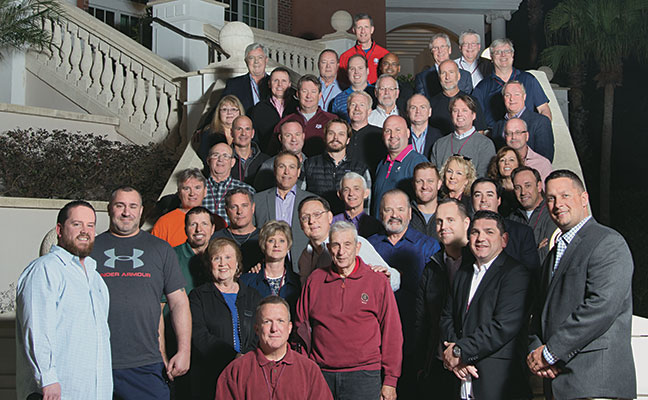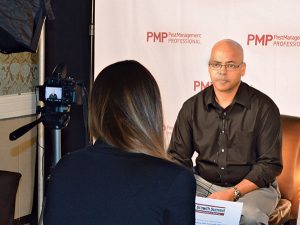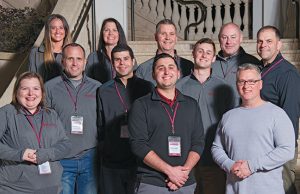
The 2017 PMP Growth Summit brain trust met Jan. 31-Feb. 2. at Reunion Resort in Orlando, Fla. Photo: Lou Ferraro
Pest Management Professional hosted eight industry-leading suppliers, and 30 pest management professionals (PMPs) representing 24 companies at its inaugural PMP Growth Summit. PMPs who attended the event shared their opinions on pest- and business-related challenges and solutions. Here are four takeaways from our discussions with PMP attendees.
1. Seek solutions about how to best work with millennials.
Working with millennials appears to be a mystery to many in the pest management industry. But most of the PMPs who attended the 2017 PMP Growth Summit devised ways to effectively manage their employees who were born between 1981 and 2000.
“Millennials really want to understand what they’re doing and why it matters,” said Mike Rottler, president of St. Louis-based Rottler Pest & Lawn Solutions. “Once you show that to them, I find that they’re easy to work with.”
Chris Cramer, owner of Cramer Pest Control, Fort Mill, S.C., also suggested employers be specific.
“Align a plan for them that details your expectations,” he said. “Once they have a proper plan laid out for them, they often can exceed any expectations that are laid out. When people don’t give millennials clear instructions, it can become frustrating for both sides.”
Being more open to the millennial lifestyle also helps, according to Michael Tulp, vice president, Adam’s Pest Control, Port St. Lucie, Fla.
“Many millennials want to have a more flexible work week,” Tulp said. “They want more time for themselves and their families. We have to be more aware, and maybe change some company policies. We don’t want to upset our older employees, but we have to be aware millennials are changing the workforce.”
To attract up-and-coming workers, Dennis Jenkins, president, ABC Pest & Lawn of DFW, Lewisville, Texas, suggested promoting the ways in which the company helps the community, because volunteering was a school requirement for many millennials.
“If we’re not giving millennials an opportunity to volunteer and make a difference in their communities, then we’re going to miss the boat with some of these folks,” he said.
2. Finding and keeping good employees remains a challenge.

From left, Andrej Branc, PelGar USA; PMP’s own Ryan Gerard; James White, Advantage Green Lawn & Pest Solutions; and Lonnie Alonso, Columbus Pest Control, show off the pro shop certificates they received for winning the golf tournament.
Photo: Joelle Harms
Bobby Jenkins, president, ABC Home & Commercial Services, Austin, Texas, said one of the industry’s biggest challenges is employee retention.
“We’ve got to do a better job of attracting people and keeping them,” he said. “This is a career growth industry. If I come into this industry, I can grow with the company, or I can grow with the industry.”
David Cooksey, CFO, McCall Services, Jacksonville, Fla., agreed. He said the number of employees who have worked at his company more than 10 years is increasing.
“We’re looking for the entrepreneur, somebody who can go out and build his or her own route, because as he or she becomes more successful, we become more successful,” Cooksey said. “We see people staying a long time because they can control their own destinies, and we sell that.”
Pamela Blauvelt, vice president and co-owner, Griffin Pest Solutions, Kalamazoo, Mich., said it’s important for prospective hires to understand that PMPs protect health and property.
“This is a good, stable industry and we provide a good service,” she said. “But getting that message out is our biggest obstacle.”
Sometimes, the obstacle is “the ick factor.” Court Parker, COO, Bug Busters USA, Woodstock, Ga., said many people who don’t like bugs won’t consider taking a job with a pest management company.
“Some people think our industry is all about bugs, but this is a people business,” Parker said. “If we can change that [perception], we will attract more talent.”
Carmen Reino, president, Anchor Pest Control Woodbridge, N.J., concurred. When he advertises for sales positions, he doesn’t mention “pest control” until he screens applicants by phone.
“If you put a sales job [ad] out there, and you don’t say ‘pest control,’ you get a better response,” Reino said. “‘Pest control sales’ seems to scare a lot of people away.”
Parker said it can be challenging to find people his company can develop. “We’re not asking for people who are already in the industry or have worked in the industry,” he said. “We want to find new talent we can train, because our industry is great at that.”
While Tulp advised making sure prospective employees fit in with the company’s culture, he added, “Then you’ve got to train, and you’ve got to train, and you’ve got to train.”
Pest management companies on the West Coast face additional challenges, as the legalization of marijuana state by state makes it tough to keep good employees.
“Finding qualified employees who can pass a criminal background check, drug screen, and a DMV check is becoming increasingly difficult,” said Gene Chafe, GM, Senske Services, Kennewick, Wash. “We’re attempting, through better wages, to attract employees, and that seems to be relatively successful in some of our markets.”
3. You can convert do-it-yourselfers

Jason Payne, Payne Pest Management, is interviewed by PMP Digital Editor Joelle Harms.
Photo: Marty Whitford
The professional pest management industry was partially built by one-time do-it-yourselfers (DIYers). The problem is, some DIYers are especially inept and give pest control, in general, a bad reputation.
“Some people think the pesticides we put down are harmful,” said James White, co-owner, Advantage Green Lawn & Pest Solutions, Summerfield, Fla. “They get this from [news reports about] people who are not in the business who make these mistakes and don’t read the labels — and then it’s like a big shadow over pest control.”
Advantage Green Lawn & Pest Solutions Co-owner William Iddings agreed.
“The first thing people think about is the product,” Iddings said. “They don’t think about the person who made this horrific error in judgment.”
So how can PMPs show potential DIYers the value of using professional services? Chafe suggested marketing to millennials.
“Most millennials don’t care to be do-it-yourselfers. Most will hire somebody before they’ll attempt to do it themselves,” Chafe said. “We’re actively involved in marketing to that group, and they seem to be willing buyers.”
As more millennials become homeowners, many will hire professionals to handle the services they need, said Alfie Treleven, president, Sprague Pest Solutions, Tacoma, Wash.
“We have a new generation coming through that is more focused on outsourcing than the baby boomers ever were,” Treleven said.
Cramer agreed. “Excel in what you do so when they do contact you, they recognize they’ve gotten into an arena [DIY pest control] they probably never should have entered,” he added. “Make sure you take care of their issues as soon as you get the opportunity; they will convert eventually.”
4. Wildlife management makes good business sense for many PMPs.

The PMP team had Summit help from several members of parent company North Coast Media.
Photo: Lou Ferraro
Several PMPs mentioned nuisance wildlife management as a growing service segment.
“With the amount of construction going on throughout the different canyons, we’re starting to see a lot more coyotes and wildlife coming into the residential areas,” said Jason Payne, president, Payne Pest Management, San Diego, Calif. “So that’s a very good opportunity for growth.”
Another key to growth is positioning PMPs as experts who can help their customers live better lives.
“We’re not only protecting people’s food and property, we’re also protecting their health and the environment, using chemicals strategically, and practicing true IPM,” Blauvelt said. “Opportunities exist simply because there are people who demand higher levels of service and pest-free zones, and the industry has responded really well to that request.”


Leave A Comment